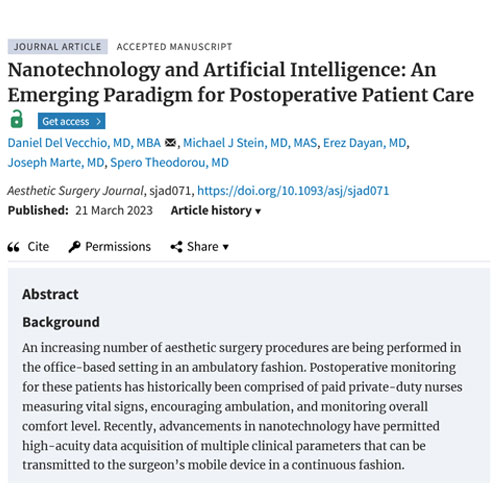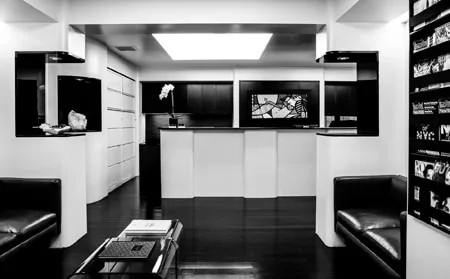Many plastic surgery procedures, including Brazilian butt lift in NYC, are now performed in outpatient settings using advanced technologies, and vary with regards to invasiveness and surgical trauma. While liposuction, abdominoplasty, and Brazilian Butt lift, (“BBL”) are very popular procedures, they can lead to life-threatening complications. While patients need to carefully follow post-operative instructions, proper monitoring of cosmetic surgery patients by the surgeon is crucial to potentially act upon any complications. Today, advancements in nanotechnology are enabling surgeons to obtain high-acuity data on multiple clinical parameters on their mobile device in a continuous fashion.

A new study, titled “Nanotechnology and Artificial Intelligence: An Emerging Paradigm for Postoperative Patient Care” authored by Daniel Del Vecchio, MD, MBA, Michael J Stein, MD, MAS, Erez Dayan, MD, Joseph Marte, MD, and Spero Theodorou, MD reports on the utilization of this emerging artificial intelligence technology in the postoperative setting. Published in Aesthetic Surgery Journal on 21 March 2023, this is the first report of the use of wearable cloth nanotechnology used to continuously monitor patients postoperatively following aesthetic surgery, using BBL as the flagship procedure.
Post-operative care is essential for any surgical procedure, including plastic surgery. After a plastic surgery procedure, the patient’s body needs time to heal and recover. Proper post-op care can help minimize complications, reduce discomfort, improve outcomes, speed up recovery time, and results.
In the past, postoperative monitoring for patients typically involved hiring private-duty nurses to monitor vital signs, encourage movement, and ensure overall comfort. The results of this prospective IRB-approved study suggest that wearable cloth nanotechnology can provide quality data that allow for effective remote monitoring in postoperative cosmetic surgery patients by the plastic surgeon.
The main objective of this study was to describe the authors’ early experience with this nanotechnology in the postoperative setting. The researchers evaluated the utility of an FDA cleared cloth nanotechnology wearable multi-sensor vest in 23 consecutive patients who underwent radiofrequency-assisted liposuction and Brazilian Butt Lift (BBL) and wore this advanced vest postoperatively. The vest is a non-invasive, wearable, and portable device.
The primary outcome of the study was device usability, reflected by compliance with device and completeness of data collection.
- Patient compliance: Up to 91% of patients wore the device for greater than 12 hours a day in the first 48 hours. All patients endorsed comfort with the device and usability with different clothing styles. Only 39% of patients were noncompliant with instructions to avoid the sitting or supine position. No postoperative events were detected.
- Completeness of Clinical Parameter Data Collection: Physiologic and biometric sensors were utilized to obtain clinical data to monitor and evaluate patients. The technology provided data on all 5 clinical parameters in all 23 patients. Except for the periods when the vest was not worn, data collection was continuously recorded with no disruptions, representing a 100% success rate of the device. The study noted that the “quality of data collected allow for detection of clinical derangements and can alert the surgeon in real time, prompting intervention such as medicine administration, position changes or presentation to the emergency room”.
A leading plastic surgeon in Manhattan, NYC, Dr. Theodorou is the founder and director of bodySCULPT. Dr. Theodorou and Dr. Christopher T. Chia invented the Brazilian butt lift under local anesthesia, an innovative procedure that avoids the risks and complications associated with BBL using general anesthesia.
